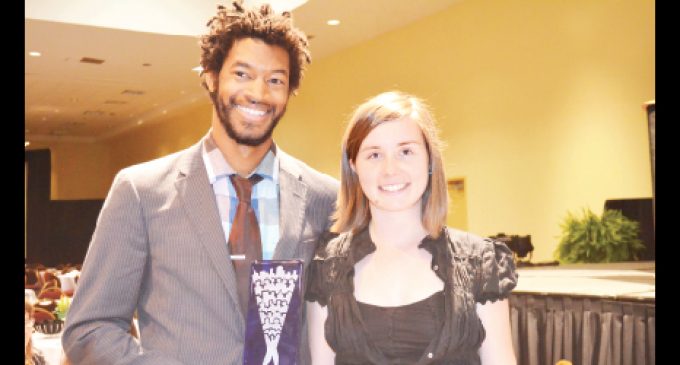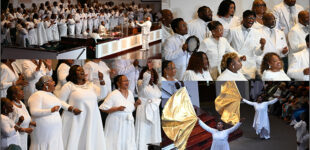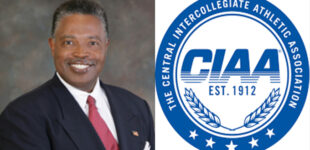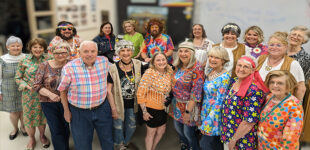Johnson: Social capital could change fortunes of the poor

Building social capital – or community connections and friendships across lines of race, class and neighborhood boundaries – is especially essential for those who are economically marginalized.
Dr. James Johnson, the William R. Kenan Jr. Distinguished Professor of Strategy and Entrepreneurship at the UNC Chapel Hill Kenan-Flager Business School and head of the Urban Investment Strategies Center, drove that point home May 1 during the keynote address he delivered at the Winston-Salem Foundation’s annual Community Luncheon at Benton Convention Center. Johnson said access to social networks, or the lack thereof, is one of the factors that separates the rich from the poor.
“The whole notion of connecting kids to institutions that can make a difference in their lives is the key to success. When you are connected to mentors and sponsors and things of that nature, these are the real people that can make a difference in your life because they have access to other networks,” he said during an interview after the luncheon. “…It’s not the people you hang out with on a daily basis, it’s the connection that matters—that’s what social capital is all about …When you have diverse networks, you know then what the possibilities are.”
At the luncheon, he was preaching to the converted. For more than a decade, the Winston-Salem Foundation has invested substantial resources in bringing Forsyth County residents closer together. It started the ECHO (Everyone Can Help Out) Network to spearhead social capital initiatives year-round. Johnson is among the many around the nation who have praised the efforts of the Foundation and ECHO.
He helped to found a charter school based on the principles of building social capital and networking. Students at the Global Scholars Academy in Durham are matched with two mentors from UNC’s MBA school each year, allowing them a chance to establish relationships with a broad cross-section of business professionals. Johnson tells the students that, in order to properly leverage these relationships in the future, they must represent themselves well.
“Part of the key to building social capital is about overcoming stereotypes,” he said. “I always tell people you only have one chance to make a first impression, so you should always look the part wherever you’re going. You always need to be on your branding game.”
In his own life, Johnson says he has benefited from what he calls “weak ties” to other networks on many occasions.
“Every job I’ve ever had came from a weak tie,” he said, relating a story where an unsolicited letter of recommendation from a professor who had watched Johnson from afar in graduate school helped him to land his first job at UCLA. Johnson later learned that the dean of the school where he had applied happened to be an old friend of the professor, who authored the letter because he was impressed by the work ethic Johnson displayed as a 25 year-old doctoral student.
Winston-Salem is home to a population whose diversity is increasing in leaps and bounds, but in order to harness the power of that new populace, citizens must learn to embrace multiculturalism and diversity and all of the challenges that come with them, Johnson said.
“Winston-Salem has a prodigious opportunity to leverage the incredible demographic diversity that the community is undergoing for great business and job creation value,” he remarked. “There’s huge opportunity in the purchase power of an increasingly diverse population. The challenge is to see them as opportunities and capitalize on them.”
Local residents walking the walk when it comes to building social capital received ECHO Awards during the luncheon.
ECHO Award winners Marcus Hill and Salem Heff were recognized for their efforts in bridging social, ethnic and generational barriers through their creation of Chaos Cooking, a loosely organized bimonthly gathering where participants share ingredients, recipes and a kitchen to create an unconventional, potluck style feast for everyone to enjoy.
“I love the randomness of the event, and that being kind of the organizing factor of it,” commented Heff, 27, an alumna of UNC Chapel Hill. “I love that people come and they don’t feel the pressure that whatever they’re making has to be perfect, and just the camaraderie of it.”
The gatherings, which vary in theme and challenge people to step outside their culinary and social comfort zones, have spawned many friendships, as well as a number of great new dishes, organizers say.
The Hispanic League, also took home an ECHO Award. Executive Director Mary Jo Turner, who has helmed the League since June, said it was a validating moment for the agency, which has awarded nearly $71,000 in college scholarships since its inception in 1992.
“It’s awesome,” declared Turner, who cites the League’s work in building cultural awareness and breaking down stereotypes about Hispanic people as being its most important. “It really helps to be recognized for the hard work that the Hispanic League has done for so many years.”
ECHO winner Aaron Bachelder founded The Enrichment Center Percussion Ensemble, a community-based musical group for adults with disabilities. Reap More than You Can Sow, a community gardening initiative, also received an award.
Karl Yena took home The Winston-Salem Foundation Award, the organization’s most prestigious honor. The retired R.J. Reynolds executive donates his time to more than 90 nonprofits. The award comes with a $10,000 grant, which Yena will donate to Leadership Winston-Salem, Second Harvest Food Bank of Northwest NC and the Shepherd’s Center of Greater Winston-Salem.

















